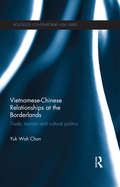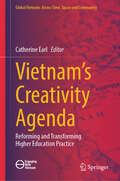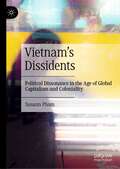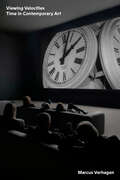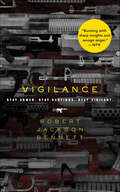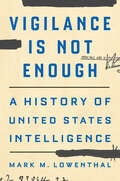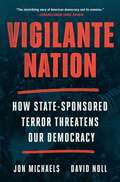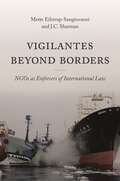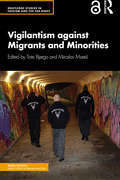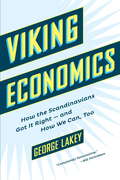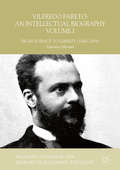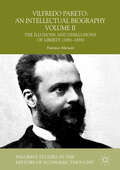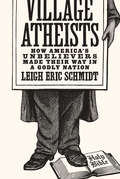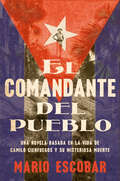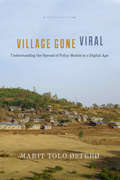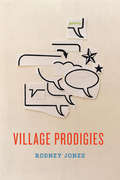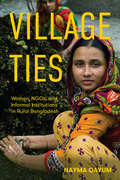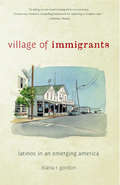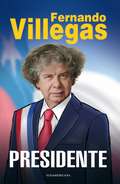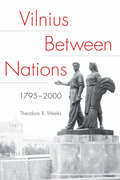- Table View
- List View
Vietnamese-Chinese Relationships at the Borderlands: Trade, Tourism and Cultural Politics (Routledge Contemporary Asia Series)
by Yuk Wah ChanEver since China and Vietnam resumed diplomatic contacts and reopened the border in 1991, the borderland region has become part of the vibrant growing economies of both countries and drawn many from the interior provinces to the borderland for new economic adventures. This book examines Chinese-Vietnamese relationships at the borderland through every day cross-border interaction in trade and tourism activities. It looks into the historical underlining of bilateral relations of the two countries which often shape people’s perceptions of the ‘other’ and interpretation of intentions of acts in their daily interaction. Albeit Chinese and Vietnamese have lived side by side for centuries, their interaction in the space of trade and modern tourism in post-war and post-reform China and Vietnam is something novel to both people. The book provides a ‘bottom-up’ approach to examine the localized experiences of inter-state relations. It illustrates the changes the vibrant economic process has brought to the borderland communities, and how the revived contacts and interaction have generated a contested space for examining Vietnamese-Chinese relationships and demonstrating trans-border cultural politics. A novel study of the strategic development of the borderland within the new political economy at China-Southeast Asia border region, this book is of interest to academics in the field of Anthropology, Border Studies, Social and Cultural Studies and Asian Studies.
Vietnam’s Creativity Agenda: Reforming and Transforming Higher Education Practice (Global Vietnam: Across Time, Space and Community)
by Catherine EarlThis book gathers a diverse set of empirical research chapters from practitioners in the higher education sector in Vietnam to explore the effects of higher education reform on university learning and teaching from the point of view of the classroom educators. Through action research, reflective practice, and other qualitative methods, the book investigates the transformations of learning and teaching practice from top-down to bottom-up, teacher-centred to student-centred, curriculum-oriented to skills-based, institutionally directed to partner integrated, and co-designed approaches. In doing so, the book challenges a rethinking of Vietnamese higher education. It reveals the ingredients for transformative education and calls for educators to be empowered with support, resources, and trust. Drawing on a broad range of disciplinary backgrounds about Vietnam’s university reforms, it is highly relevant to social anthropologists, educational specialists, and policymakers working in higher education reform, not only in Vietnam and other Southeast Asian contexts, but globally.
Vietnam’s Dissidents: Political Dissonance in the Age of Global Capitalism and Coloniality
by Susann PhamThis book is the first ethnography on Vietnam’s contemporary dissident movement. As a country that became known and is still remembered as one of the last remnants of Communist revolutions, Vietnam has managed to lift itself from one of the poorest war-torn post-colonies to one of the fastest growing market economies in Southeast Asia. Yet, while holding on to the legacy of a communist-led liberation movement, the present-day Communist Party of Vietnam (CPV) finds itself subject to political challenges from below. In recent years, dissident voices critical of the party-state's malgovernance over social, economic and environmental issues have mushroomed across classes, generations and provinces. Based on extensive ethnographic data, this book explores distinct political practices and political ideas of Vietnam's dissidents. It examines different anti-capitalist and anti-authoritarian practices of democracy, labour, peasant and religious activists and reveals that anti-capitalist and anti-authoritarian practices are—at times—motivated by nationalist, anti-communist and statist ideas and ideologies. Understanding this dissonance between political practices and political ideas within the context of global capitalism and coloniality lies at the heart of this book.
Viewers Like You: How Public TV Failed the People
by Laurie OuelletteHow "public" is public television if only a small percentage of the American people tune in on a regular basis? When public television addresses "viewers like you," just who are you? Despite the current of frustration with commercial television that runs through American life, most TV viewers bypass the redemptive "oasis of the wasteland" represented by PBS and turn to the sitcoms, soap operas, music videos, game shows, weekly dramas, and popular news programs produced by the culture industries. Viewers Like You? traces the history of public broadcasting in the United States, questions its priorities, and argues that public TV's tendency to reject popular culture has undermined its capacity to serve the people it claims to represent. Drawing from archival research and cultural theory, the book shows that public television's perception of what the public needs is constrained by unquestioned cultural assumptions rooted in the politics of class, gender, and race.
Viewing Velocities: Time in Contemporary Art
by Marcus VerhagenContemporary art and the culture of speedHow have artists responded to our market-driven, tech-enabled culture of speed? Viewing Velocities explores a contemporary art scene caught in the gears of 24/7 capitalism. It looks at artists who embrace the high-octane experience economy and others who are closer to the slow movement. Some of the most compelling artworks addressing the cadences of contemporary work and leisure play on distinct, even contradictory conceptions of time. From Danh Vo's relics to Moyra Davey's photographs of dust-covered belongings, from Roman Ondak's queuing performers and Susan Hiller's outdoor sleepers to Maria Eichhorn's art strike and Ruth Ewan's giant reconstruction of the French revolutionary calendar, artists have drawn out aspects of the present temporal order that are familiar to the point of near-invisibility, while outlining other, more liberating ways of conceiving, organising and experiencing time.Marcus Verhagen builds on the work of theorists Jonathan Crary, Hartmut Rosa and Jacques Rancière to trace lines of insurgent art that recast struggles over time and history in novel and revealing terms.
Vigilance
by Robert Jackson BennettRobert Jackson Bennett's Vigilance is a dark science fiction action parable from an America that has permanently surrendered to gun violence.The United States. 2030. John McDean executive produces "Vigilance," a reality game show designed to make sure American citizens stay alert to foreign and domestic threats. Shooters are introduced into a "game environment," and the survivors get a cash prize.The TV audience is not the only one that's watching though, and McDean soon finds out what it's like to be on the other side of the camera.At the Publisher's request, this title is being sold without Digital Rights Management Software (DRM) applied.
Vigilance Is Not Enough: A History of United States Intelligence
by Mark M. LowenthalA broad and deep survey of American intelligence from before the Revolution to the present Every nation has an intelligence apparatus—some means by which its top officials acquire needed information on sensitive issues. But each nation does it differently, influenced by its history, its geographical conditions, and its political traditions. In this book, Mark M. Lowenthal examines the development of U.S. intelligence to explain how and why the United States went from having no intelligence service to speak of to being the world&’s predominant intelligence power almost overnight, and he discusses the difficult choices involved in maintaining that dominance in a liberal democracy. Lowenthal describes how the lack of a tradition of spycraft both hindered and helped American efforts to develop intelligence services during and after the Second World War. He points to the political pragmatism—leading to difficult choices—with which most intelligence directors operated; the constant tension between security and civil liberties in a constitutional democracy; the tension between the need for secrecy and the accountability required for democratic governance; and the way the growing importance of technology changed both the methods and the objectives of intelligence gathering. Far more than simply an episodic history, this book offers an analysis of why American intelligence developed as it did—and what it has meant for the nation&’s and the world&’s politics.
Vigilance: My Life Serving America and Protecting Its Empire City
by Ray KellyTwo-time New York City police commissioner Ray Kelly opens up about his remarkable life, taking us inside fifty years of law enforcement leadership, offering chilling stories of terrorist plots after 9/11, and sharing his candid insights into the challenges and controversies cops face today. The son of a milkman and a Macy's dressing room checker, Ray Kelly grew up on New York City's Upper West Side, a middle-class neighborhood where Irish and Puerto Rican kids played stickball and tussled in the streets. He entered the police academy and served as a marine in Vietnam, living and fighting by the values that would carry him through a half century of leadership-justice, decisiveness, integrity, courage, and loyalty. Kelly soared through the NYPD ranks in decades marked by poverty, drugs, civil unrest, and a murder rate that, at its peak, spiked to over two thousand per year. Kelly came to be known as a tough leader, a fixer who could go into a troubled precinct and clean it up. That reputation catapulted him into his first stint as commissioner, under Mayor David Dinkins, where Kelly oversaw the police response to the 1993 World Trade Center bombing and spearheaded programs that would help usher in the city's historic drop in crime. Eight years later, in the chaotic wake of the 9/11 attacks, newly elected mayor Michael Bloomberg tapped Kelly to be NYC's top cop once again. After a decade working with Interpol, serving as undersecretary of the Treasury for enforcement, overseeing U.S. Customs, and commanding an international police force in Haiti, Kelly understood that New York's security was synonymous with our national security. Believing that the city could not afford to rely solely on "the feds," he succeeded in transforming the NYPD from a traditional police department into a resource-rich counterterrorism-and-intelligence force. In this vital memoir, Kelly reveals the inside stories of his life in the hot seat of "the capital of the world"-from the terror plots that nearly brought a city to its knees to his dealings with politicians, including Presidents Bill Clinton, George W. Bush, and Barack Obama as well as Mayors Rudolph Giuliani, Bloomberg, and Bill DeBlasio. He addresses criticisms and controversies like the so-called stop-question-and-frisk program and the rebuilding of the World Trade Center and offers his insights into the challenges that have recently consumed our nation's police forces, even as the need for vigilance remains as acute as ever.
Vigilante Nation: How State-Sponsored Terror Threatens Our Democracy
by Jon Michaels David NollFor readers of How Democracies Die, two legal scholars expose the MAGA Republican strategy to roll back civil, political, and privacy rights and subvert American democracy—and prescribe a plan for beating the Christian nationalists at their own game.Time and again, when confronted with serious challenges to their power and privilege, white Christian nationalists seek solace—and satisfaction—in state-supported forms of vigilantism. This was true at the dawn of the American republic, when Northern abolitionists threatened the Southern slavocracy. It was also true in the aftermath of the Civil War, when emancipated Black Americans and their Northern allies sought to fulfill the promises of Reconstruction. And though this pattern was seemingly broken after the Civil Rights revolution of the 1950s and &’60s—and abandoned once and for all—legal vigilantism has made a surprising, roaring comeback in the months and years following the failed coup of January 6, 2021. Committed to never again losing power, let alone experiencing the humiliation that followed on the heels of the ham-fisted insurrection, overlapping networks of right-wing lawyers, politicians, plutocrats, and preachers have resurrected state-supported vigilantism. Vigilante Nation tells this story of the American Right marginalizing, subordinating, and disenfranchising the increasingly diverse and cosmopolitan members of the American polity. This book exposes the vigilantes&’ plans, explains their methods—everything from book bans to anti-abortion bounties to attacks on government proceedings, including elections—and underscores the stakes. Now that supporters of democratic equality are numerous and dexterous enough to finally secure the broad promises of the civil rights revolution, the race is on for Donald Trump, J.D. Vance, and the architects of Project 2025 to subvert our democracy before a countermovement can rise up to thwart their insidious plans.
Vigilantes beyond Borders: NGOs as Enforcers of International Law
by J C Sharman Mette Eilstrup-SangiovanniHow and why NGOs are increasingly taking independent and direct action in global law enforcement, from human rights to the environment Nongovernmental organizations (NGOs) have generally served as advocates and service providers, leaving enforcement to states. Now, NGOs are increasingly acting as private police, prosecutors, and intelligence agencies in enforcing international law. NGOs today can be found investigating and gathering evidence; suing and prosecuting governments, companies, and individuals; and even catching lawbreakers red-handed. Examining this trend, Vigilantes beyond Borders considers why some transnational groups have opted to become enforcers of international law regarding such issues as human rights, the environment, and corruption, while others have not.Three factors explain the rise of vigilante enforcement: demand, supply, and competition. Governments commit to more international laws, but do a poor job of policing them, leaving a gap and creating demand. Legal and technological changes make it easier for nonstate actors to supply enforcement, as in the instances of NGOs that have standing to use domestic and international courts, or smaller NGOs that employ satellite imagery, big data analysis, and forensic computing. As the growing number of NGOs vie for limited funding and media attention, smaller, more marginal, groups often adopt radical strategies like enforcement.Looking at the workings of major organizations, including Amnesty International, Greenpeace, and Transparency International, as well as smaller players, such as Global Witness, the Sea Shepherd Conservation Society, and Bellingcat, Vigilantes beyond Borders explores the causes and consequences of a novel, provocative approach to global governance.
Vigilantism against Migrants and Minorities (Routledge Studies in Fascism and the Far Right)
by Tore Bjørgo Miroslav MaresThis edited volume traces the rise of far right vigilante movements – some who have been involved in serious violence against minorities, migrants and other vulnerable groups in society, whereas other vigilantes are intimidating but avoid using violence. Written by an international team of contributors, the book features case studies from Western Europe, Eastern Europe, North America, and Asia. Each chapter is written to a common research template examining the national social and political context, the purpose of the vigilante group, how it is organised and operates, its communications and social media strategy and its relationship to mainstream social actors and institutions, and to similar groups in other countries. The final comparative chapter explores some of the broader research issues such as under which conditions such vigiliantism emerges, flourishes or fails, policing approaches, masculinity, the role of social media, responses from the state and civil society, and the evidence of transnational co-operation or inspiration. This is a groundbreaking volume which will be of particular interest to scholars with an interest in the extreme right, social movements, political violence, policing and criminology.
Vignettes & Vino: Dinner Table Stories from the Trump White House with Recipes & Cocktail Pairings
by Brian Morgenstern Teresa MorgensternThese are true, human, lighthearted, and significant moments from the most high-stakes environment on Earth, the White House—written by two people who found love at the intersection of politics, a global pandemic, civil strife, an unexpected Supreme Court confirmation, and a heated presidential election—presented with comfort food recipes and cocktail pairings.This book is full of aspirational, surprising, funny, and interesting stories from insiders who were there at the highest levels of government during the election and pandemic of 2020. The stories are combined with themed, practical recipes and cocktails for lovers of American history. Vignettes & Vino is a one-stop handbook for your next dinner party!
Viking Boorish, King of England
by Borja Loma Barrie Jorge Alberto Campos GarcíaHistorical novel. Biography. William of Normandy and his acces to power. The humiliation by his condition of bastard. Revenge on those who offended and humiliated him. History of the Vikings. How and why they settled in Normandy before the impotence of the king of France. The Vikings in England. The assault of William to England and his coronation in Westminster.
Viking Economics: How the Scandinavians Got It Right-and How We Can, Too
by George LakeyLiberals worldwide invoke Scandinavia as a promised land of equality, while most conservatives fear it as a hotbed of liberty-threatening socialism. But the left and right can usually agree on one thing: that the Nordic system is impossible to replicate elsewhere. The US and UK are too big, or too individualistic, or too . . . something. In Viking Economics--perhaps the most fun economics book you've ever read--George Lakey dispels these myths. He explores the inner-workings of the Nordic economies that boast the world's happiest, most productive workers, and explains how, if we can enact some of the changes the Scandinavians fought for surprisingly recently, we, too, can embrace equality in our economic policy.
Vilfredo Pareto: From Liberty to Science (1898–1923) (Palgrave Studies in the History of Economic Thought)
by Fiorenzo MornatiThis volume of intellectual biography takes the Italian economist, sociologist, political scientist Vilfredo Pareto (1848-1923) from his disillusionment with liberal and pacifist activism, to the original development of pure economics and the composition of his Treatise on General Sociology and the test of this latter on the war and post-war events.
Vilfredo Pareto: From Science to Liberty (1848–1891) (Palgrave Studies in the History of Economic Thought)
by Paul Wilson Fiorenzo MornatiThis three volume series of intellectual biography considers the life, work and impact on economic, social and political theory of the Italian economist, sociologist and political scientist Vilfredo Pareto (1848–1923).This volume covers the period starting from his childhood up to his early political activism, amateur journalism and initial scholarly contributions. His pre-Lausanne years are often neglected by students of Pareto, but form the intellectual and biographical background to his later contributions to economic, social and political theory.
Vilfredo Pareto: The Illusions and Disillusions of Liberty (1891–1898) (Palgrave Studies in the History of Economic Thought)
by Fiorenzo MornatiThis three volume series of intellectual biography considers the life, work and impact on economic, social and political theory of the Italian economist, sociologist and political scientist Vilfredo Pareto (1848-1923).This second volume follows Pareto from his time teaching at Lausanne to the juncture in his life where he first began to make theoretical contributions of his own. Mornati considers Pareto’s work on pure economics, general equilibrium, welfare economics and the economic case for socialism, as well as his critical observations of Italian and Swiss public policy.
Village Atheists: How America's Unbelievers Made Their Way in a Godly Nation
by Leigh Eric SchmidtA much-maligned minority throughout American history, atheists have been cast as a threat to the nation's moral fabric, barred from holding public office, and branded as irreligious misfits in a nation chosen by God. Yet, village atheists--as these godless freethinkers came to be known by the close of the nineteenth century--were also hailed for their gutsy dissent from stultifying pieties and for posing a necessary secularist challenge to majoritarian entanglements of church and state. Village Atheists explores the complex cultural terrain that unbelievers have long had to navigate in their fight to secure equal rights and liberties in American public life.Leigh Eric Schmidt rebuilds the history of American secularism from the ground up, giving flesh and blood to these outspoken infidels, including itinerant lecturer Samuel Porter Putnam; rough-edged cartoonist Watson Heston; convicted blasphemer Charles B. Reynolds; and atheist sex reformer Elmina D. Slenker. He describes their everyday confrontations with devout neighbors and evangelical ministers, their strained efforts at civility alongside their urge to ridicule and offend their Christian compatriots. Schmidt examines the multilayered world of social exclusion, legal jeopardy, yet also civic acceptance in which American atheists and secularists lived. He shows how it was only in the middle decades of the twentieth century that nonbelievers attained a measure of legal vindication, yet even then they often found themselves marginalized on the edges of a God-trusting, Bible-believing nation.Village Atheists reveals how the secularist vision for the United States proved to be anything but triumphant and age-defining for a country where faith and citizenship were--and still are--routinely interwoven.
Village Commander, The \ El comandante del pueblo (Spanish ed.): Una novela basada en la vida de Camilo Cienfuegos y su misteriosa muerte
by Mario EscobarEl autor bestseller internacional, Mario Escobar, regresa con la impactante historia de Camilo Cienfuegos, el héroe olvidado de la Revolución cubana.Camilo Cienfuegos fue un carismático revolucionario que se hizo amigo de Fidel Castro cuando empezaron las protestas para derrocar la dictadura de Fulgencio Batista. Siempre fiel a los ideales de la Revolución, Cienfuegos luchó al lado de Fidel, Raúl y el Che Guevara, y llegó a ganarse la simpatía del pueblo cubano gracias a su humildad y franqueza.Tras ganar varias batallas, la rivalidad entre Camilo y Fidel se fue acentuando y sus ideales se separaron. Las ideas pacifistas de Camilo le ganaron el afecto de la gente, pero la ambición de Castro por el poder absoluto y una secreta envidia de su fiel amigo lo borrarían de la historia.Cuando, temeroso de los designios de los Castro, Camilo decidió irse al exilio, un trágico accidente lo hizo desaparecer del mapa. Algunos creen que el avión en el que viajaba de regreso a la Habana, después de atender los últimos encargos de Fidel, fue derribado por un misil. Lo cierto es que no quedaron rastros de él ni de los supuestos testigos del accidente. ¿Algún día se sabrá la verdad? International bestselling author Mario Escobar returns with the powerful story of Camilo Cienfuegos, the unsung hero of the Cuban Revolution.Camilo Cienfuegos was a charismatic revolutionary who befriended Fidel Castro when protests began to overthrow the dictatorship of Fulgencio Batista. Always loyal to the ideals of the Revolution, Cienfuegos fought alongside Fidel, Raul, and Che Guevara, and won the sympathy of the Cuban people thanks to his humility and honesty.After winning several battles, the rivalry between Camilo and Fidel grew stronger and their ideals diverged. Camilo's pacifist ideas won him the affection of the people, but Castro's ambition for absolute power and a secret envy to his faithful friend would erase him from history.When, fearful of the Castro's designs, Camilo decided to go into exile, a tragic accident made him disappear from the map. Some believe that the plane in which he was traveling back to Havana, after attending to Fidel's last orders, was shot down by a missile. What is certain is that no traces of him or of the supposed witnesses of the accident were left. Will the truth be known some day?
Village Gone Viral: Understanding the Spread of Policy Models in a Digital Age (Anthropology of Policy)
by Marit Tolo ØstebøIn 2001, Ethiopian Television aired a documentary about a small, rural village called Awra Amba, where women ploughed, men worked in the kitchen, and so-called harmful traditional practices did not exist. The documentary radically challenged prevailing images of Ethiopia as a gender-conservative and aid-dependent place, and Awra Amba became a symbol of gender equality and sustainable development in Ethiopia and beyond. Village Gone Viral uses the example of Awra Amba to consider the widespread circulation and use of modeling practices in an increasingly transnational and digital policy world. With a particular focus on traveling models—policy models that become "viral" through various vectors, ranging from NGOs and multilateral organizations to the Internet—Marit Tolo Østebø critically examines the hidden dimensions of models and model making. While a policy model may be presented as a "best practice," one that can be scaled up and successfully applied to other places, the local impacts of the model paradigm are far more ambivalent—potentially increasing social inequalities, reinforcing social stratification, and concealing injustice. With this book, Østebø ultimately calls for a reflexive critical anthropology of the production, circulation, and use of models as instruments for social change.
Village Prodigies
by Rodney Jones“A novel in language as dense and lush and beautiful as poetry . . . [or] a book of poetry with the vivid characters and the narrative force of a novel? Whatever you care to call it, it’s a remarkable achievement.” — Richard Russo, Pulitzer Prize–winning author of Empire Falls Village Prodigies imagines the town of Cold Springs, Alabama, from 1950 to 2015 and unfurls its narrative reach as six boys—prodigies and swains—grow up and leave the familiarity of home and the rural South. Yet all prodigies, all memories, all stories inevitably loop back. Through a multiplicity of points of view and innovative forms, Rodney Jones plays with the contradictions in our experience of time, creating portals through which we travel between moments and characters, from the interior mind to the most exterior speech, from delusions to rational thought. We experience Alzheimer’s and its effect on family, listen to family lore and read family Facebook posts, relive war, and revive half-forgotten folktales and video games. In this deep examination of personal and communal memory, Jones blurs the lines between analog and digital, poetry and prose.
Village Ties: Women, NGOs, and Informal Institutions in Rural Bangladesh
by Nayma QayumAcross the global South, poor women’s lives are embedded in their social relationships and governed not just by formal institutions – rules that exist on paper – but by informal norms and practices. Village Ties takes the reader to Bangladesh, a country that has risen from the ashes of war, natural disaster, and decades of resource drain to become a development miracle. The book argues that grassroots women’s mobilization programs can empower women to challenge informal institutions when such programs are anti-oppression, deliberative, and embedded in their communities. Qayum dives into the work of Polli Shomaj (PS), a program of the development organization BRAC to show how the women of PS negotiate with state and society to alter the rules of the game, changing how poor people access resources including safety nets, the law, and governing spaces. These women create a complex and rapidly transforming world where multiple overlapping institutions exist – formal and informal, old and new, desirable and undesirable. In actively challenging power structures around them, these women defy stereotypes of poor Muslim women as backward, subservient, oppressed, and in need of saving.
Village of Immigrants
by Professor Diana R. GordonGreenport, New York, a village on the North Fork of Long Island, has become an exemplar of a little-noted national trend--immigrants spreading beyond the big coastal cities, driving much of rural population growth nationally. In Village of Immigrants, Diana R. Gordon illustrates how small-town America has been revitalized by the arrival of these immigrants in Greenport, where she lives. Greenport today boasts a population that is one-third Hispanic. Gordon contends that these immigrants have effectively saved the town's economy by taking low-skill jobs, increasing the tax base, filling local schools, and patronizing local businesses. Greenport's seaside beauty still attracts summer tourists, but it is only with the support of the local Latino workforce that elegant restaurants and bed-and-breakfasts are able to serve these visitors. For Gordon the picture is complex, because the wave of immigrants also presents the town with challenges to its services and institutions. Gordon's portraits of local immigrants capture the positive and the negative, with a cast of characters ranging from a Guatemalan mother of three, including one child who is profoundly disabled, to a Colombian house painter with a successful business who cannot become licensed because he remains undocumented. Village of Immigrants weaves together these people's stories, fears, and dreams to reveal an environment plagued by threats of deportation, debts owed to coyotes, low wages, and the other bleak realities that shape the immigrant experience--even in the charming seaport town of Greenport. A timely contribution to the national dialogue on immigration, Gordon's book shows the pivotal role the American small town plays in the ongoing American immigrant story--as well as how this booming population is shaping and reviving rural communities.
Villegas Presidente
by Fernando Villegas Darrouy¡Atención, ciudadanos! Un nuevo contrincante se suma a la lucha por La Moneda Fernando Villegas analiza en este libro la situación política de nuestro país y repasa la actuación de los distintos candidatos, desde la silenciosa Michelle Bachelet hasta el resucitado Pablo Longueira, pasando por Andrés Allamand, ME-O, Andrés Velasco, Camila Vallejo, Giorgio Jackson y el defenestrado Laurence Golborne. Entretanto espera que a través de un llamado telefónico lo inviten a presentar su propia candidatura a la Presidencia de Chile, pues su programa está claro como el agua: nos educará «a puntapiés», porque lo que nos hace falta a los chilenos no son revoluciones, sino orden, disciplina y educación cívica: menos actitudes ordinarias y más léxico, menos internet y más libros, menos pose de progresistas y más profundidad, menos rabia, menos resentimiento, menos rostros ofuscados y gente tirando mala leche.
Vilnius between Nations, 1795–2000 (NIU Series in Slavic, East European, and Eurasian Studies)
by Theodore WeeksThe inhabitants of Vilnius, the present-day capital of Lithuania, have spoken various languages and professed different religions while living together in relative harmony over the years. The city has played a significant role in the history and development of at least three separate cultures—Polish, Lithuanian, and Jewish—and until very recently, no single cultural-linguistic group composed the clear majority of its population. Vilnius between Nations, 1795–2000 is the first study to undertake a balanced assessment of this particularly diverse city. Theodore Weeks examines Vilnius as a physical entity where people lived, worked, and died; as the object of rhetorical struggles between disparate cultures; and as a space where the state attempted to legitimize a specific version of cultural politics through street names, monuments, and urban planning. In investigating these aspects, Weeks avoids promoting any one national narrative of the history of the city, while acknowledging the importance of national cultures and their opposing myths of the city's identity. The story of Vilnius as a multicultural city and the negotiations that allowed several national groups to inhabit a single urban space can provide lessons that are easily applied to other diverse cities. This study will appeal to scholars of Eastern Europe, urban studies, and multiculturalism, as well as general readers interested in the region.
